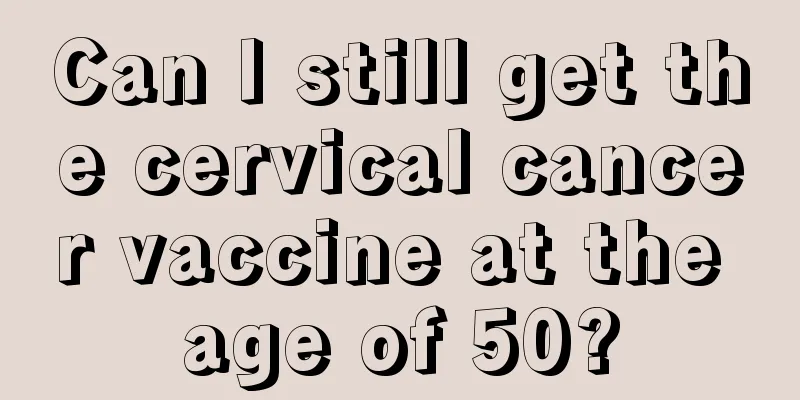Can I still get the cervical cancer vaccine at the age of 50?

|
Cervical cancer vaccines can still be given at the age of 50, but whether they are suitable should be determined based on individual circumstances, especially for women who have not been infected with high-risk HPV. Vaccination can still provide some protection. It is recommended to consult a doctor before vaccination and undergo HPV virus testing and related evaluations. Cervical cancer vaccine (HPV vaccine) is mainly used to prevent cervical cancer caused by human papillomavirus (HPV) infection. The applicable age range varies among different types of vaccines. The recommended vaccination age for common bivalent, quadrivalent and nine-valent vaccines is 9-45 years old. However, if a 50-year-old woman has not yet been infected with high-risk HPV, vaccination can theoretically still produce immune protection. Studies have shown that the vaccine has no therapeutic effect on already infected viruses, so 50-year-old women need to make sure they are not infected with high-risk HPV before vaccination. The immune effect will decrease with age, and earlier vaccination will have greater benefits. If you have had sexual intercourse in the past or have a higher risk of infection, the protective efficacy of the vaccine may be partially limited. Cervical cancer vaccine (HPV vaccine) is mainly used to prevent cervical cancer caused by human papillomavirus (HPV) infection. The applicable age range varies among different types of vaccines. The recommended vaccination age for common bivalent, quadrivalent and nine-valent vaccines is 9-45 years old. However, if a 50-year-old woman has not yet been infected with high-risk HPV, vaccination can theoretically still produce immune protection. Studies have shown that the vaccine has no therapeutic effect on already infected viruses, so 50-year-old women need to make sure they are not infected with high-risk HPV before vaccination. The immune effect will decrease with age, and earlier vaccination will have greater benefits. If you have had sexual intercourse in the past or have a higher risk of infection, the protective efficacy of the vaccine may be partially limited. Before vaccination, it is recommended to seek professional consultation, including HPV typing test and cervical cancer screening (such as TCT or HPV-DNA test) to ensure that the infection status is controllable. If it is suitable for vaccination, you should try to choose a vaccine type that does not have contraindications such as allergies. Regular cervical cancer screening is still required after vaccination because the vaccine cannot cover all types of carcinogenic viruses. Women over 50 need to pay more attention to other health management, including quitting smoking, improving immunity and improving lifestyle, etc., to reduce the risk of related diseases. |
<<: Is teratoma a hereditary disease?
>>: Reasons why renal hamartoma grows larger
Recommend
How long a person with nasopharyngeal cancer can live is affected by many factors
Many nasopharyngeal cancer patients are afraid th...
What is the difference between bitter buckwheat and buckwheat
Buckwheat and bitter buckwheat are similar, just ...
How to wash clothes stained with ink
How to wash clothes stained with ink? I believe e...
Is sweat alkaline or acidic
Sweat can be divided into two types on our body, ...
What are the benefits of using a hot towel on your face? It turns out there are these 8 benefits
Many people like to use hot towels to apply to th...
How long after teratoma surgery can I eat?
The postoperative diet time is usually determined...
What can you eat after breast cancer surgery? You can eat more of these 7 types of food after breast cancer surgery
Breast cancer is a common breast disease. There a...
What are the main ways to prevent gastric cancer?
The high incidence of gastric cancer is very comm...
There are bloodshot lumps 5 days after tooth extraction
If there is a problem with our teeth, they need t...
What is the difference between perianal abscess and anal fistula
The occurrence of perianal abscess and anal fistu...
What are the dangers of abdominal liposuction
As the living standards are getting higher and hi...
Effects of White Poria Honey Mask
Loving beauty is women's nature. Every woman ...
What to do if you sprain your hamstring? How to recover quickly
In life, some small accidents can cause our hamst...
What to do if your fingers are dry and peeling?
Dry fingers is a physiological phenomenon that oc...
How to use winter melon to whiten and remove freckles
Winter melon is a very common vegetable and it is...









